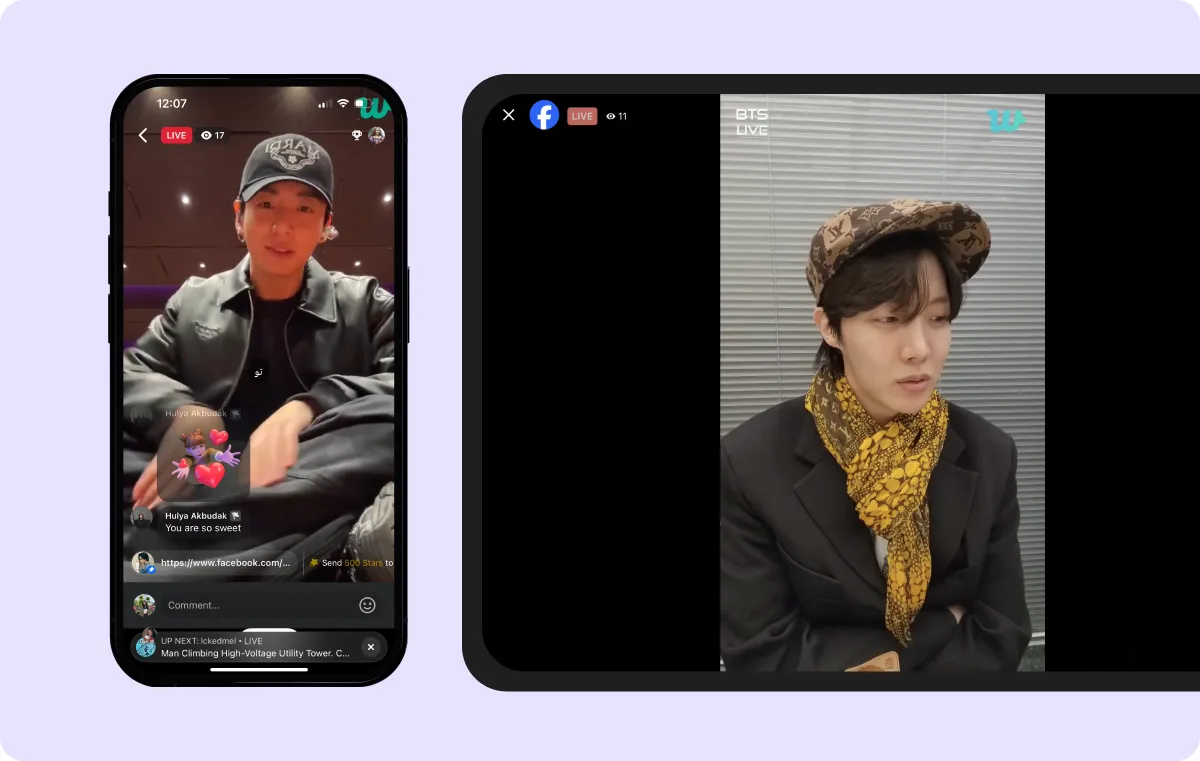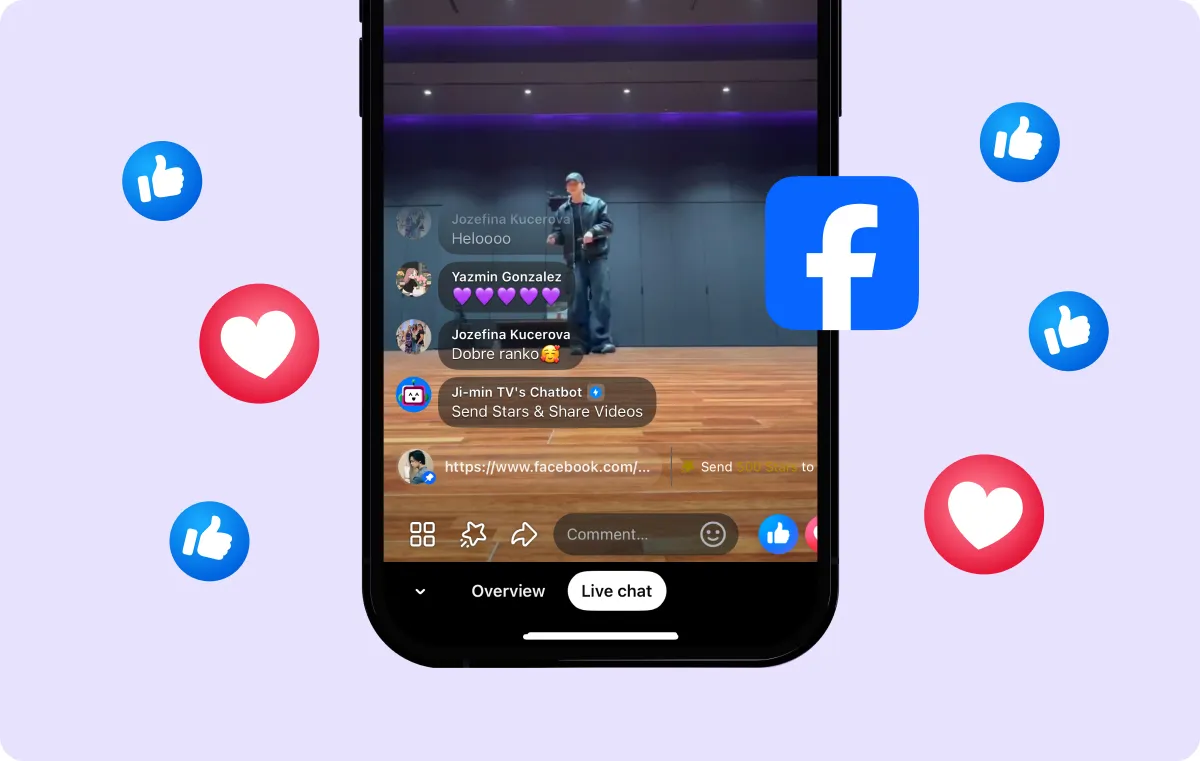Facebook has evolved from a simple way to share daily life updates into a key tool for content creators. Over time, the platform has released more features that help influencers build a community. One such feature is Facebook Live, which allows people to broadcast themselves in real time.
In fact, knowing how to use Facebook Live helps new creators turn casual viewers into loyal followers.
What’s Facebook Live?
Facebook Live is the social media platform’s in-house streaming feature. Creators broadcast themselves doing a wide range of activities, from playing video games to fixing cars. During these livestreams, viewers can comment, react, and share in real time, which gives the format more of an interactive feel than prerecorded footage.
Top Benefits of Going Live on Facebook
More than 3 billion people worldwide are active on Facebook each month, and that number is on the rise. Video impacts this growth — in 2024, time spent watching videos on Facebook increased by around 25%. So, going live on Facebook is a viable way to connect with a large global audience. Here are just a few ways this content creation style benefits your profile.
Builds Audience Connections
When you go live on Facebook, viewers can engage in real-time discussions with you and each other about your content. Responding to followers’ questions and trying out their ideas on screen makes your community feel involved in the creative process, increasing their investment in your stream and overall success. This also makes them more likely to tune in for future broadcasts, knowing they’ll have the opportunity to interact with you.
This high engagement boosts the bonds between you and your community. Facebook also notifies your followers when you go live, increasing opportunities for engagement.
Generates Content You Can Repurpose
If you have the right settings enabled, Facebook saves your live videos. You can then repost these streams on other platforms to increase your reach. For instance, reupload your long-form videos to YouTube, or cut out highlights to share on platforms such as TikTok and Instagram.
Captions’ Repurpose AI does this for you automatically — simply upload your broadcast and let AI scan your footage for the most viral-worthy clips.
How To Go Live on Facebook: 3 Steps

Below, we’ll cover how to go live on Facebook on mobile and desktop and share tips on customizing your Facebook livestream settings.
1. Meet Streaming Criteria
To go live on Facebook, your account must be at least 60 days old, and your Page or professional profile needs a minimum of 100 followers.
2. Configure Your Livestream Settings
Facebook offers several tools to improve your live broadcasts and boost engagement.
These features include:
- Live polls — Click the “Interactivity” button and select “Polls” to learn about your audience’s preferences in real time.
- Featured links — Add links to your stream to promote your website, blog, or newsletter.
- Live in Stories — Share your streams in your Stories to reach more followers.
- Comment moderation — Use built-in tools to block specific words from your comments section and suspend or ban followers from your stream. You can also hire a moderator to do this for you.
- Monetization — Facebook offers several ways to make money from livestreams, including donation buttons, links to products on sale on Facebook, in-stream ads, and paid subscriptions.
3. Go Live
This step varies depending on whether you’re streaming from your phone or computer.
On Mobile
- Sign in — Go to your Facebook Page or professional account.
- Tap “What’s on your mind?” — Select “Live video.”
- Select your audience — Choose whether you want the stream to be public or friends only.
- Customize the stream — Add details like descriptions, tagged friends, and effects.
- Start broadcasting — Hit “Go live” when you’re ready.
- End the stream — Tap “Finish” to end your live broadcast, then choose whether to delete the video or post it to your profile.
On Desktop
- Sign in — Look for “Live video” on your Facebook feed, Page, or profile. You can also go live from the Meta Business Suite homepage instead.
- Tap “Go live” — Then, select your audience from the following options: Friends, Public, Custom, and Only me.
- Head to the “Stream setup” tab — Select your webcam. Adjust additional camera and microphone settings in the “Camera controls” page.
- Add post details — Write a title and description, then choose whether to notify followers about your broadcast. You can also choose where to post your video, such as on your timeline, a Page you manage, or your Facebook Story.
- Click “Go live” — Start your stream.
- Tap “End Live Video” — Stop the broadcast.
8 Facebook Live Best Practices

Follow these eight best practices to improve your Facebook Live content strategy.
1. Create Engaging Thumbnails, Titles, and Descriptions
Your thumbnail is the first thing people see in their Facebook feed — it’s your stream’s preview. If you don’t upload one, Facebook pulls the first frame of your video, which might not represent you well. To make a strong first impression, create a custom thumbnail that clearly shows who you are and what your stream is about. Use your logo, brand colors, and, if possible, your face — familiarity helps with recognition.
Your description and title do the same job in text form. Write short, engaging lines that introduce you and your stream.
2. Promote Your Livestream Ahead of Time
Letting your fans know your livestream is coming increases attendance, so create a Facebook event for your broadcast or promote it on other social media platforms. Additionally, ask your fans to turn their notifications on so they receive word when you go live.
3. Run a Test To Avoid Technical Problems
To calm your nerves and avoid technical problems, do a practice livestream or two by toggling the audience setting (at the top of your screen) to “Only me.” This will allow you to double-check that your camera and microphone are working and that your background and lighting look good. It’ll also confirm that you have a strong enough internet connection to handle streaming.
4. Stream at the Right Time for Your Audience
To increase engagement, stream while your audience is already online. Check your analytics to see where most viewers live, then schedule sessions to match their peak hours. Experiment with different times to find what works best.
5. Be Authentic
Some people find it difficult to be themselves when they’re on camera, but the key to authenticity is treating your stream like a real conversation. Talk to your audience like they’re friends, and more of your personality will shine through naturally.
6. Add Subtitles to Your Broadcast
Adding subtitles to your video makes your videos more accessible to viewers who keep the volume off or have hearing impairments. Use third-party tools for real-time captioning, and after the stream is over, try Captions’ Auto Subtitle Generator to automatically write subtitles for your recording.
7. Permit Audience Reactions
Build a community by running polls, responding to comments, and using live chat. Instead of just talking at your audience, engage with them — this keeps conversations going and brings them back for future streams.
8. Analyze Metrics
Facebook gives you access to insights and analytics for your live videos, such as view counts, demographics, and engagement data. Use this information to see what worked and what didn’t to improve your next livestream. You might also be able to use these conclusions to inform your live strategy on another platform, such as Instagram and YouTube Live.
Generate Engaging Content With Captions
Facebook live sessions are an excellent way to connect with your audience. These unscripted uploads showcase your personality well, drawing in new viewers interested in your content and niche.
Streaming benefits don’t end when you tap “Finish” — and Captions has all the AI tools you need to get the most out of your Facebook broadcasts. Long Video to Short Video AI helps you repurpose your content in seconds by trimming segments of your recording to share on other platforms. Once you find the perfect clips, upload them to the Facebook Video Editor to give your footage a polished, professional feel.
Connect with a wider audience faster with Captions.
FAQ
How Do I Download Facebook Live Videos to My Computer?
If you want to save your own streams, the platform gives you the option to save your footage once the broadcast ends. It’ll post the video to your profile, and you can click the “Options” button to select the “Download” feature.
To save someone else’s stream, you’ll need to record your screen or use third-party tools.
Is Facebook Livestreaming Free?
Yes, Facebook Live is a free platform, so it’s an attractive option for content creators or businesses just starting to build an online presence.









